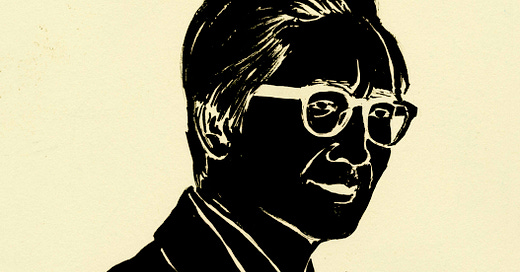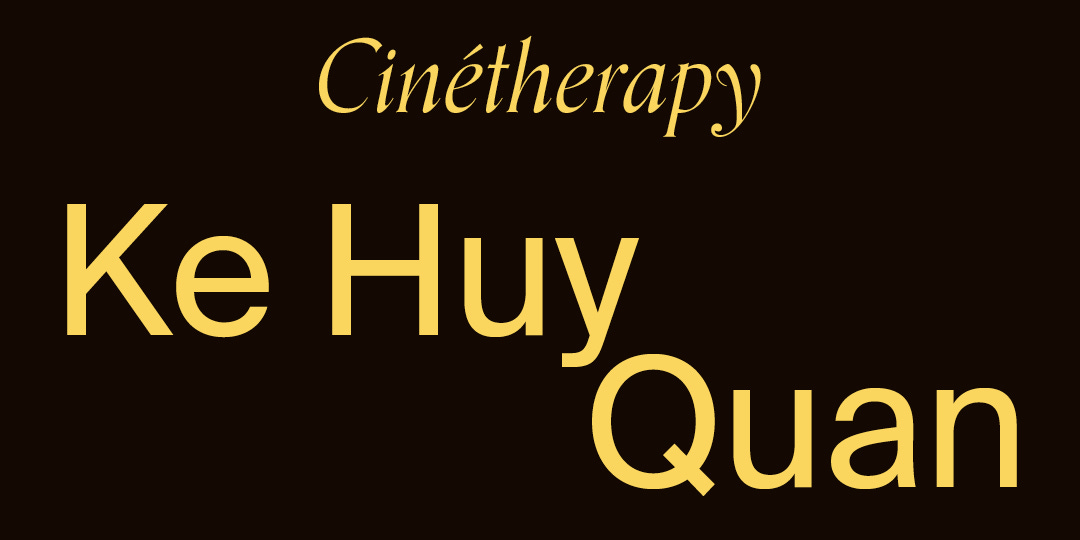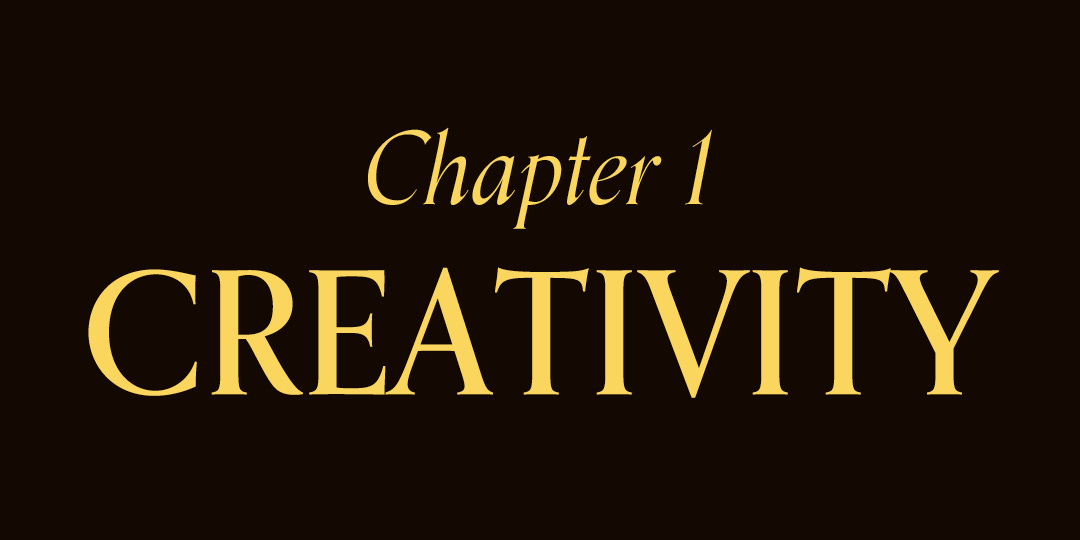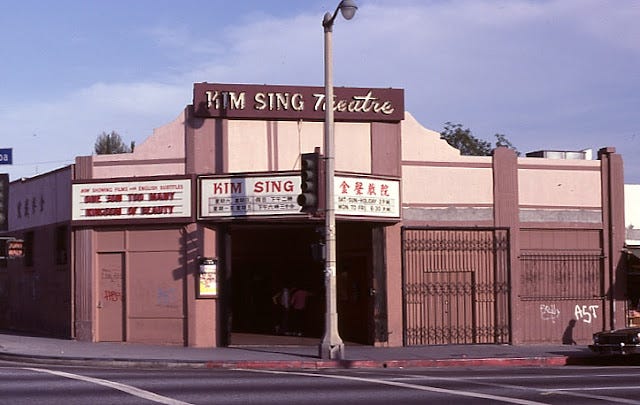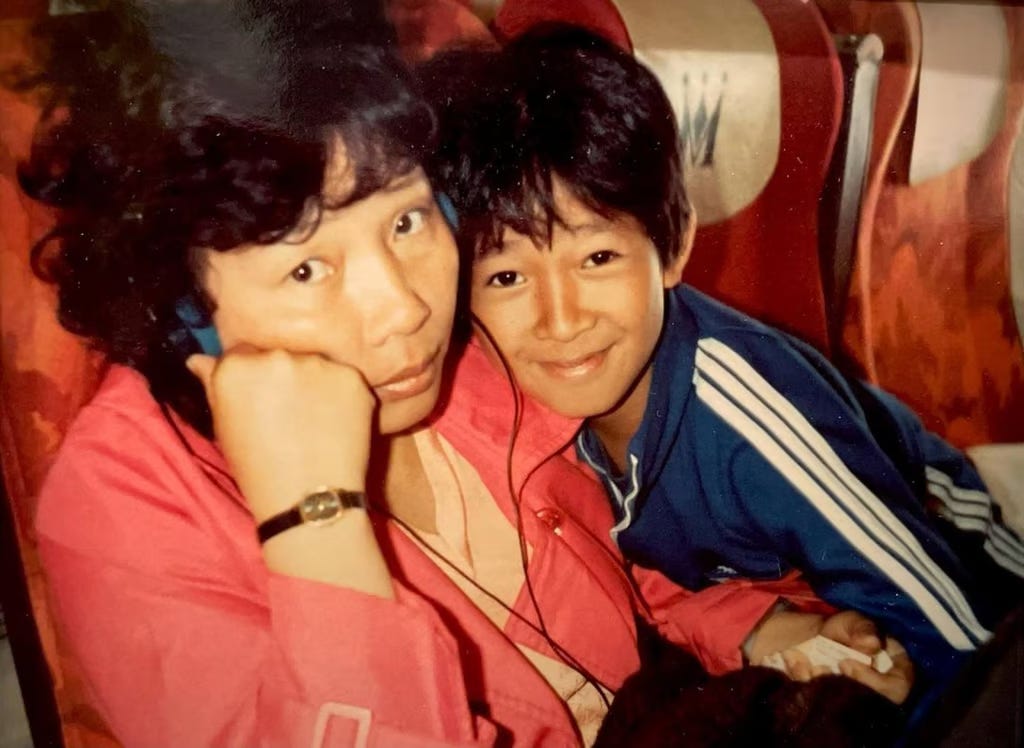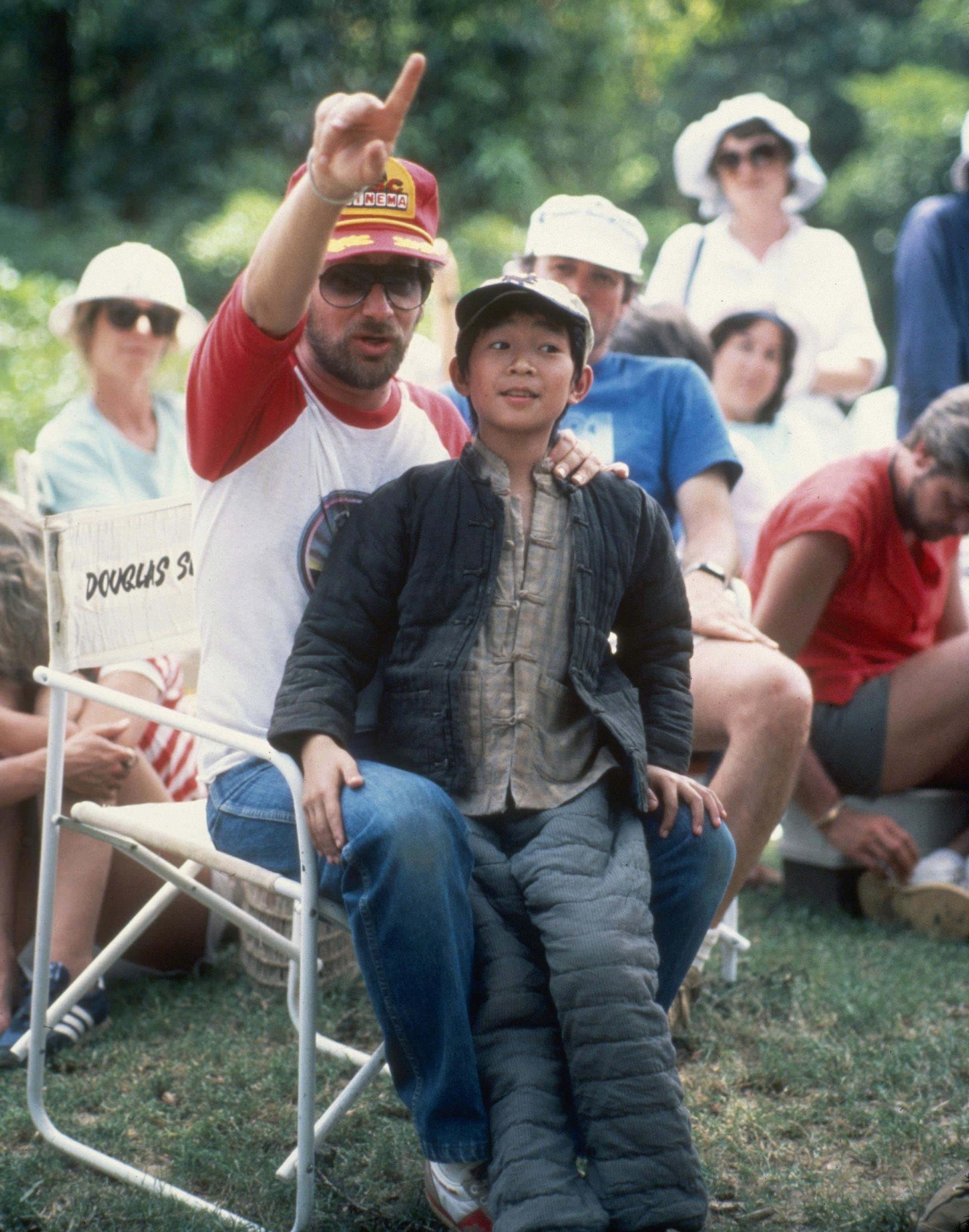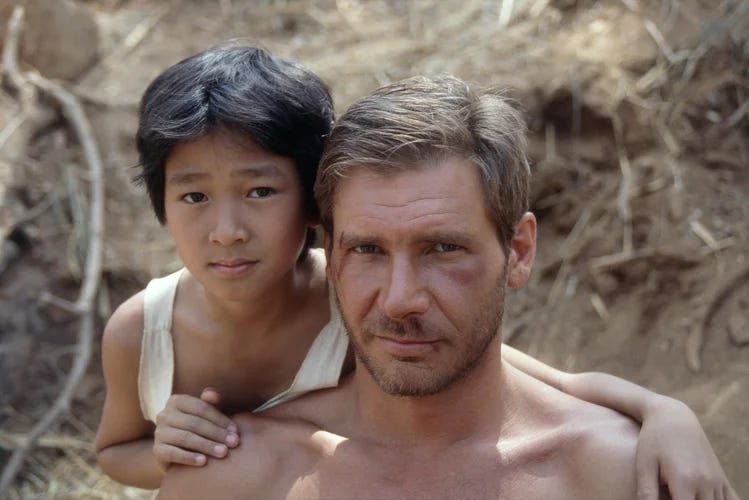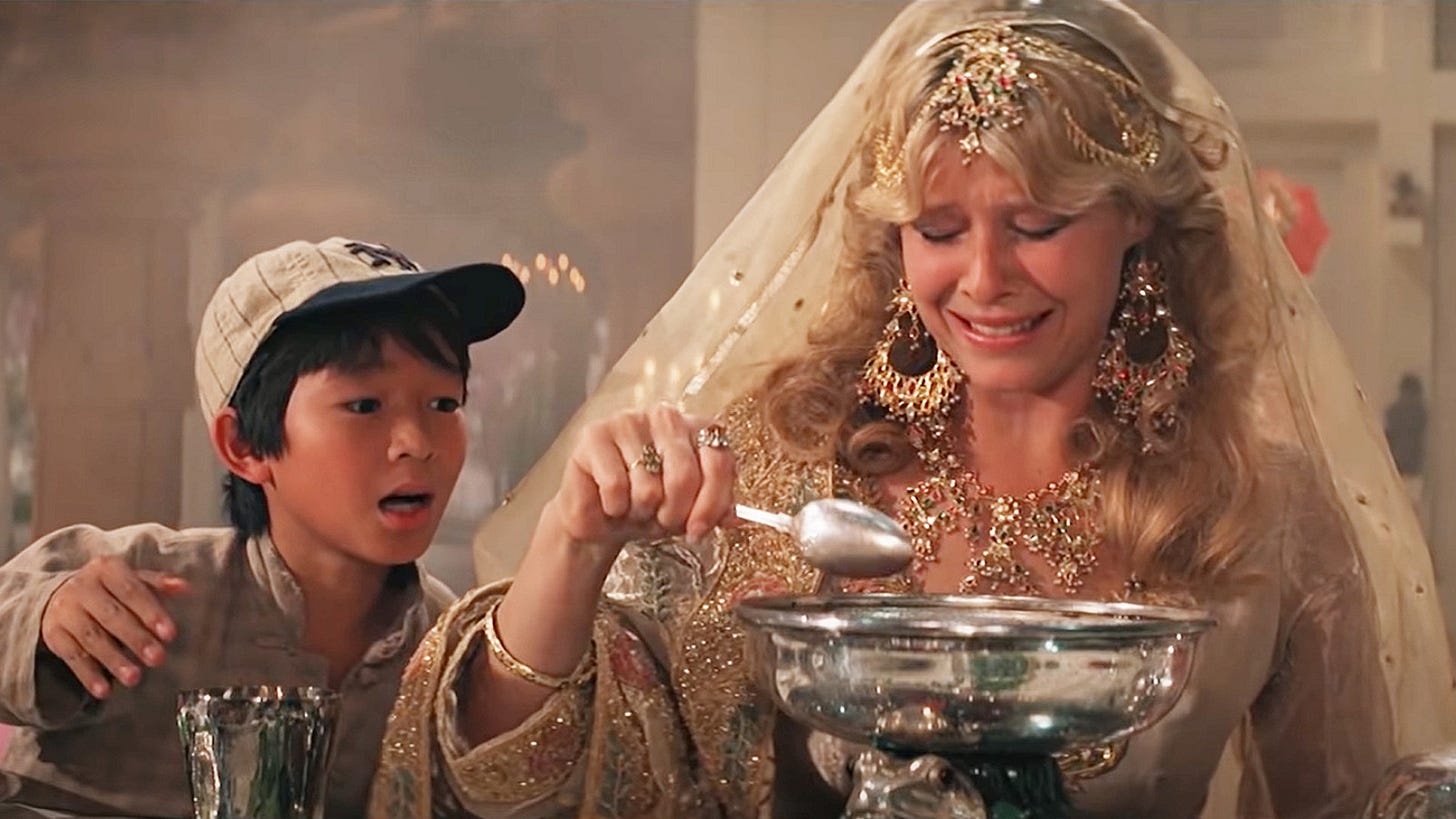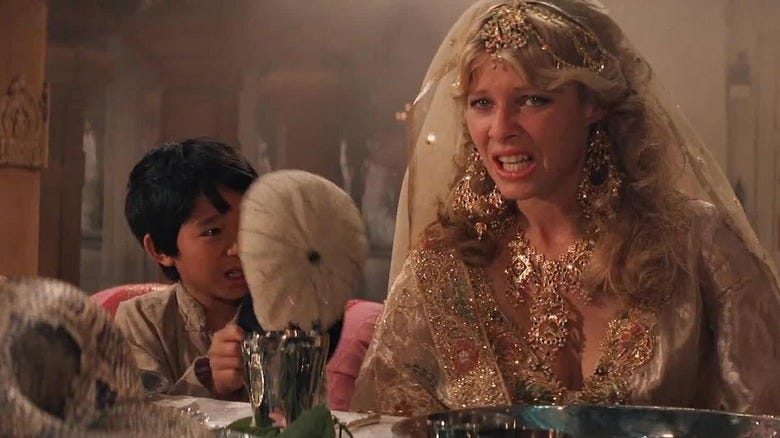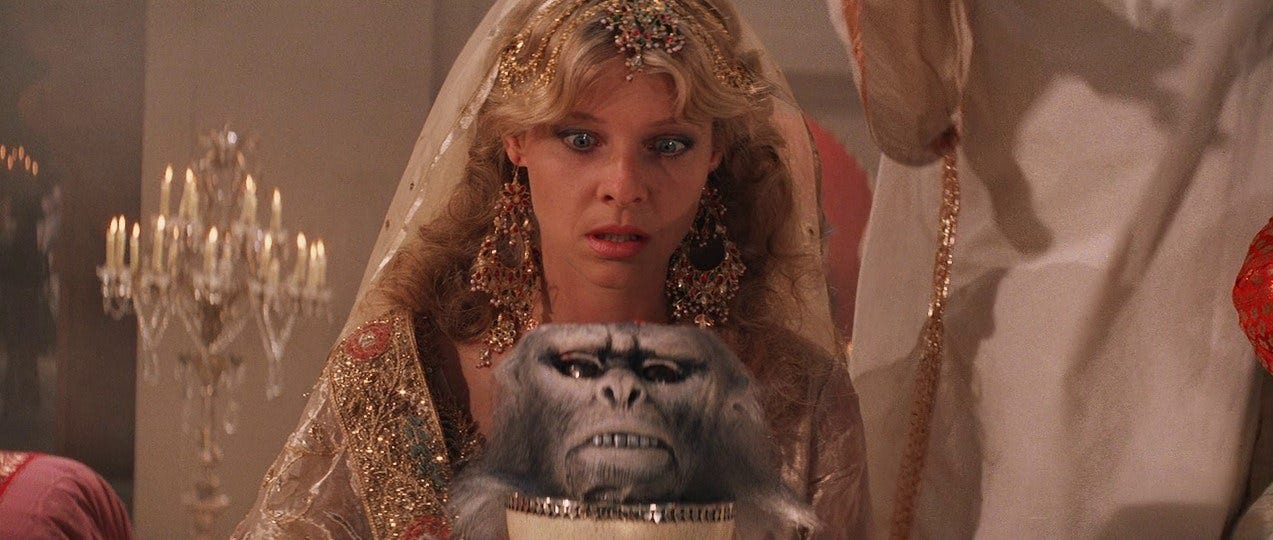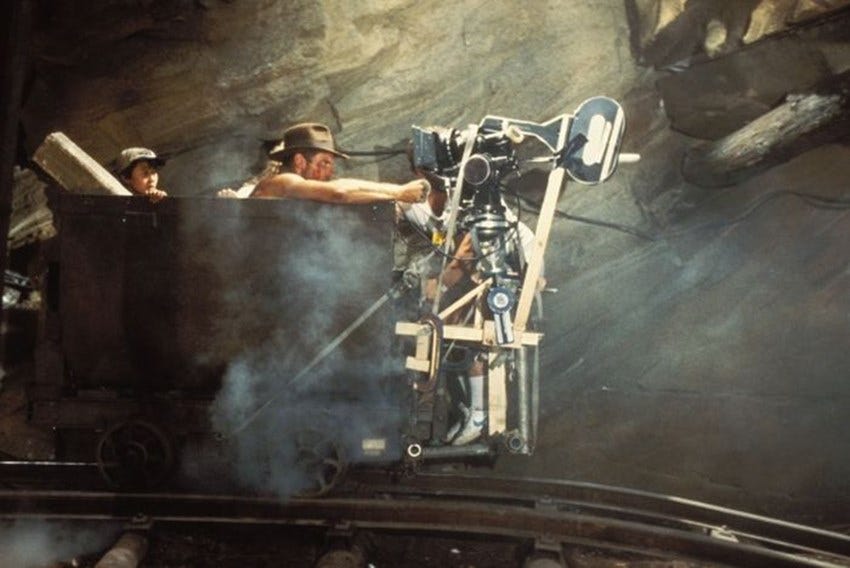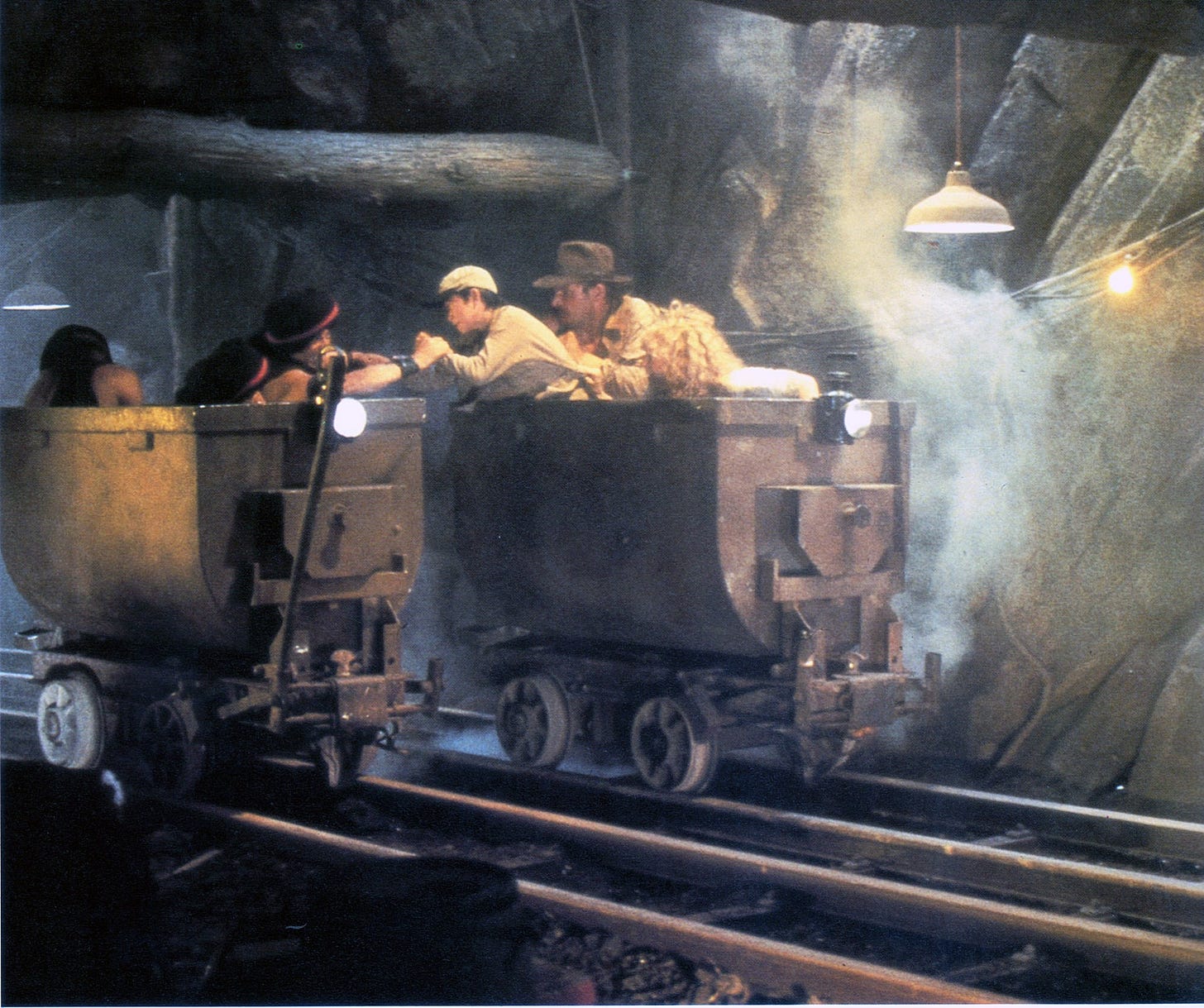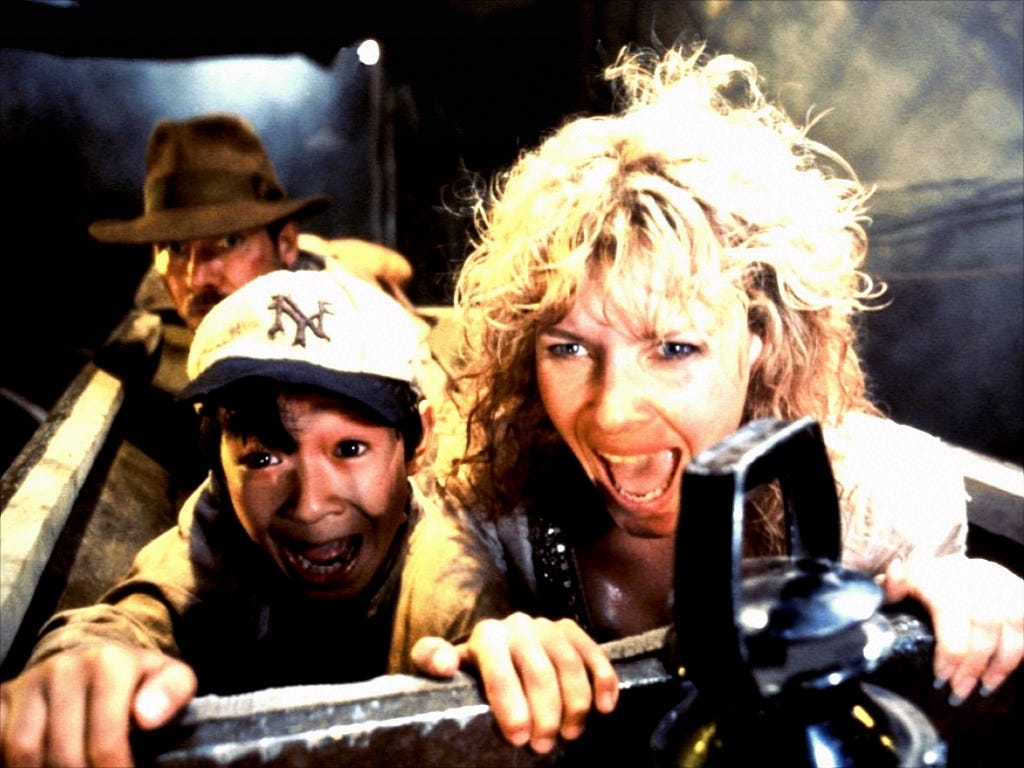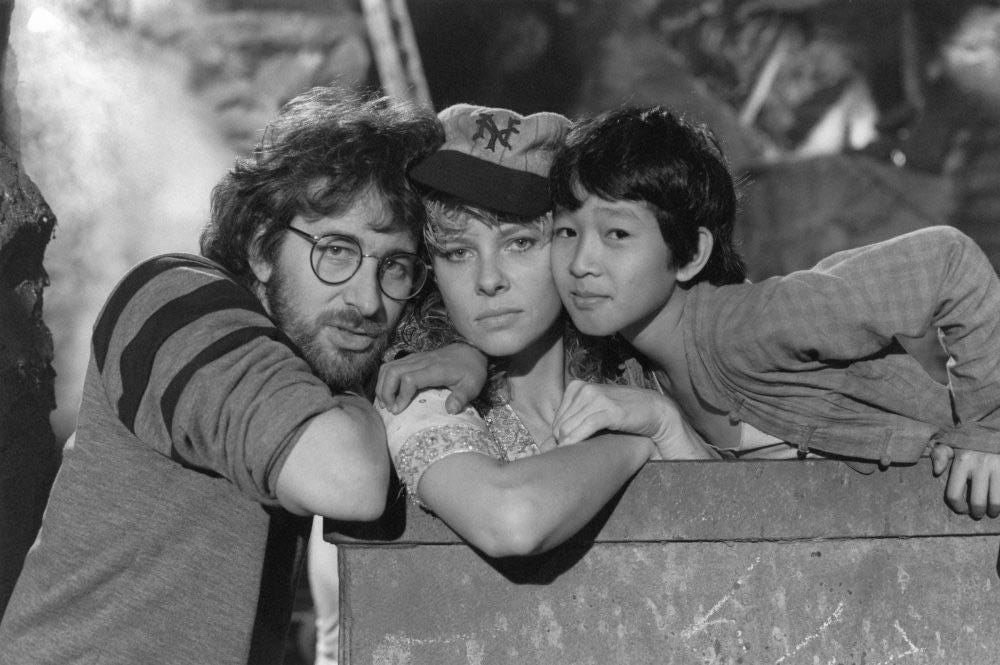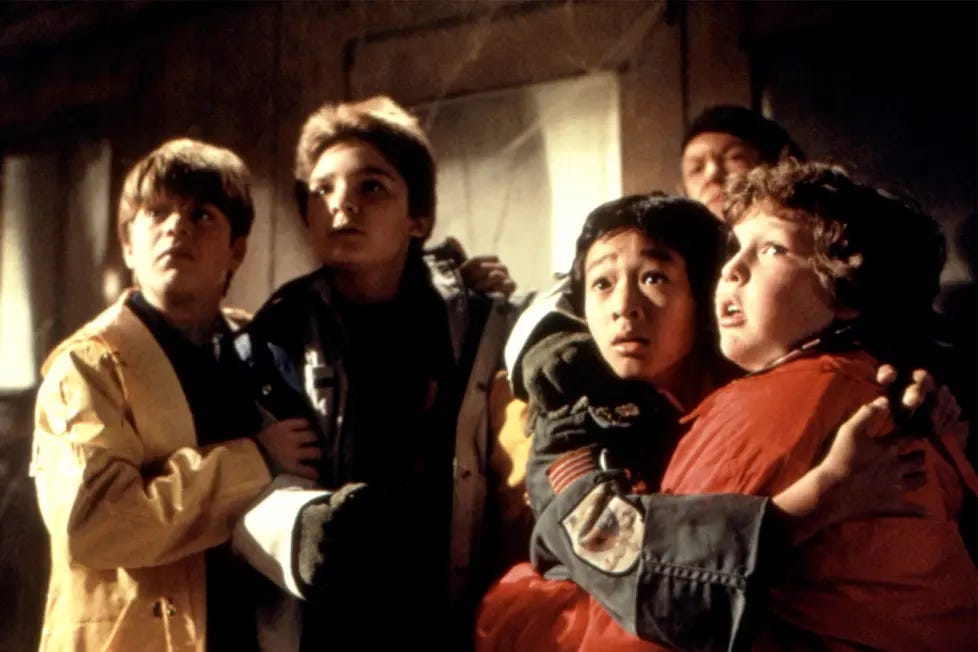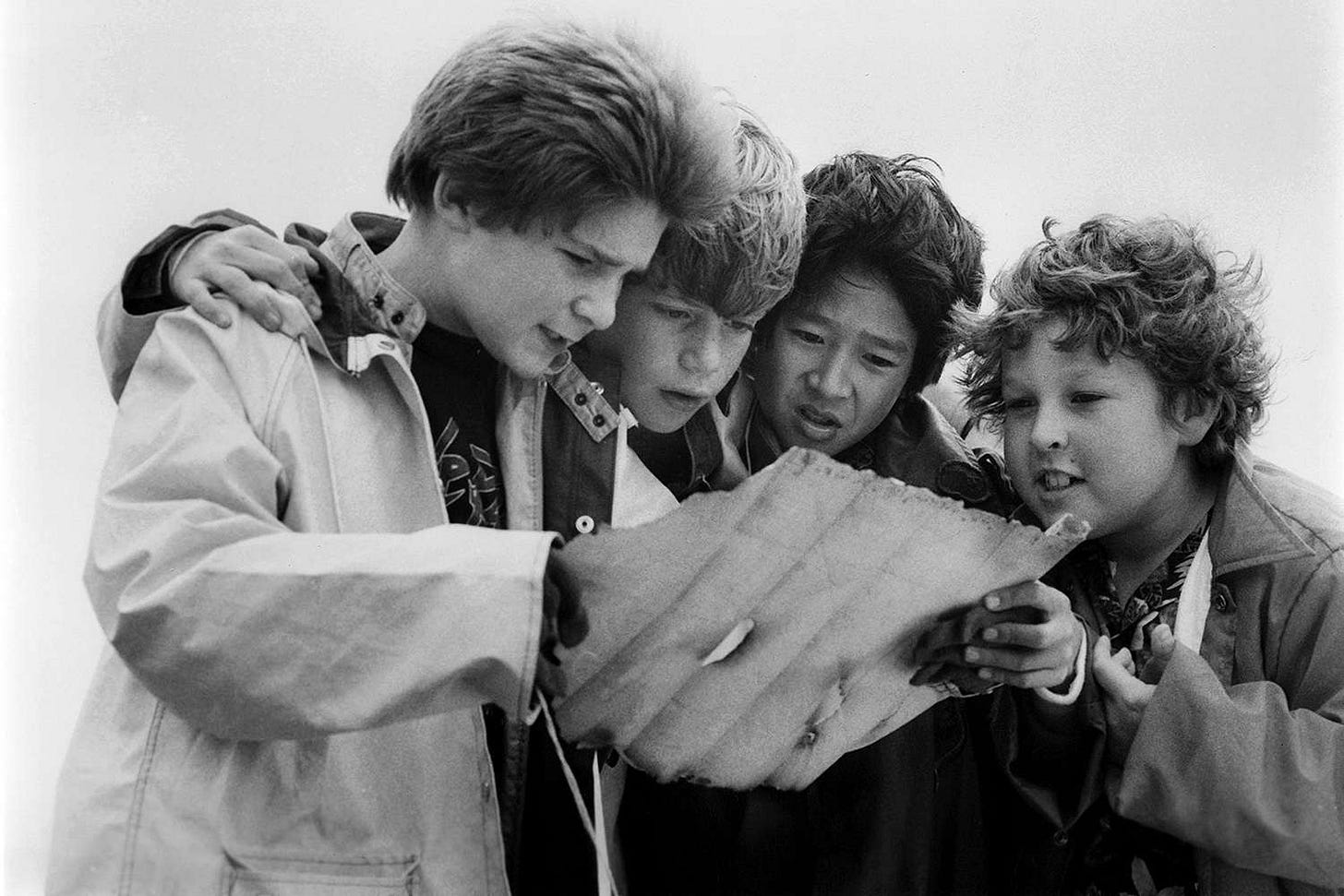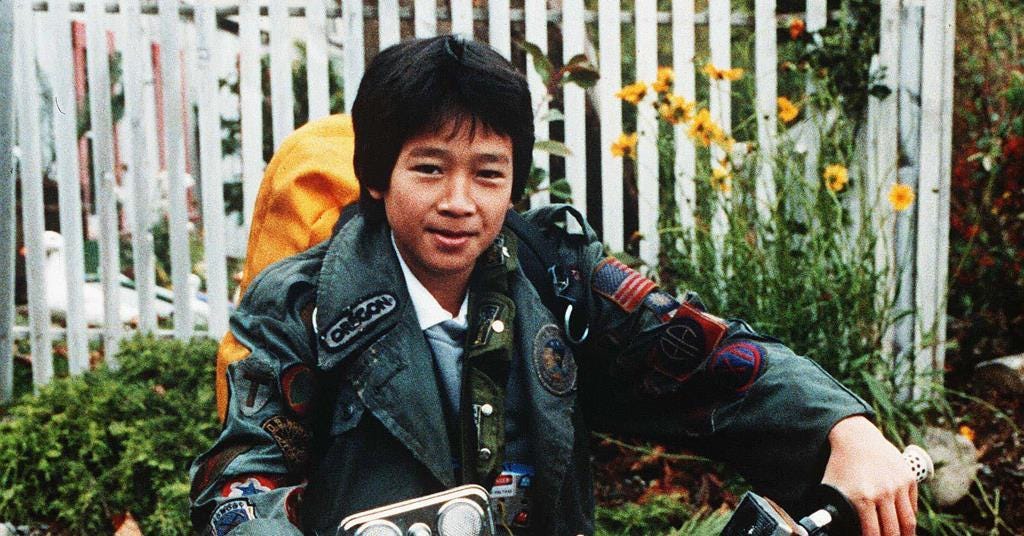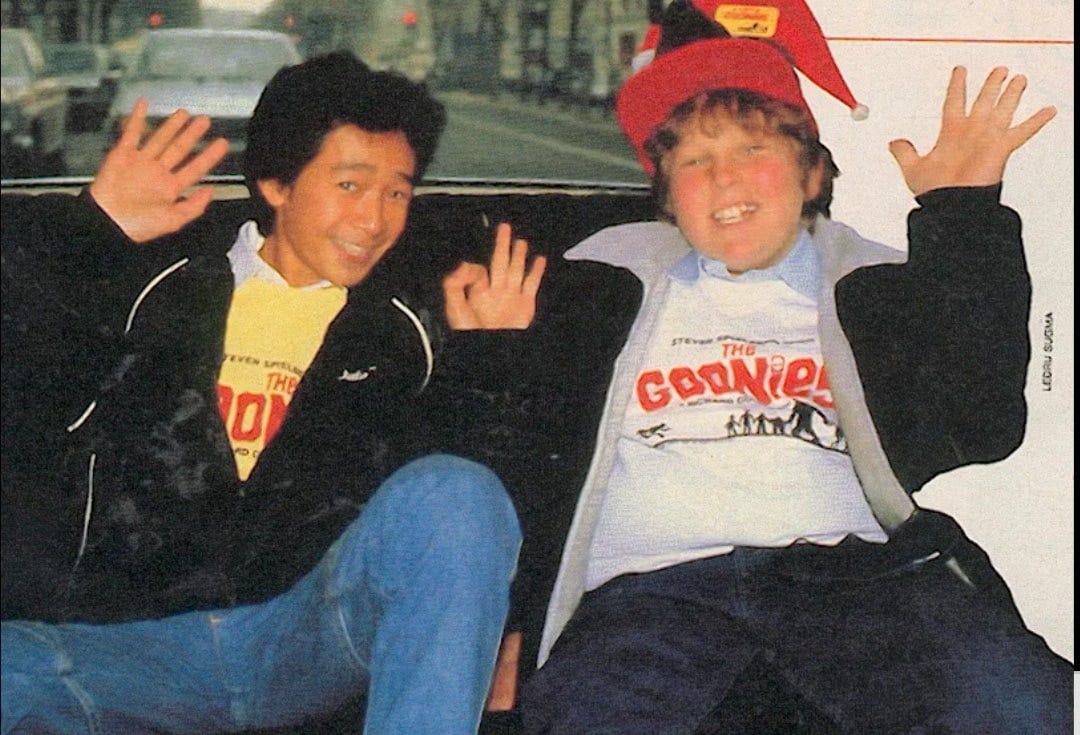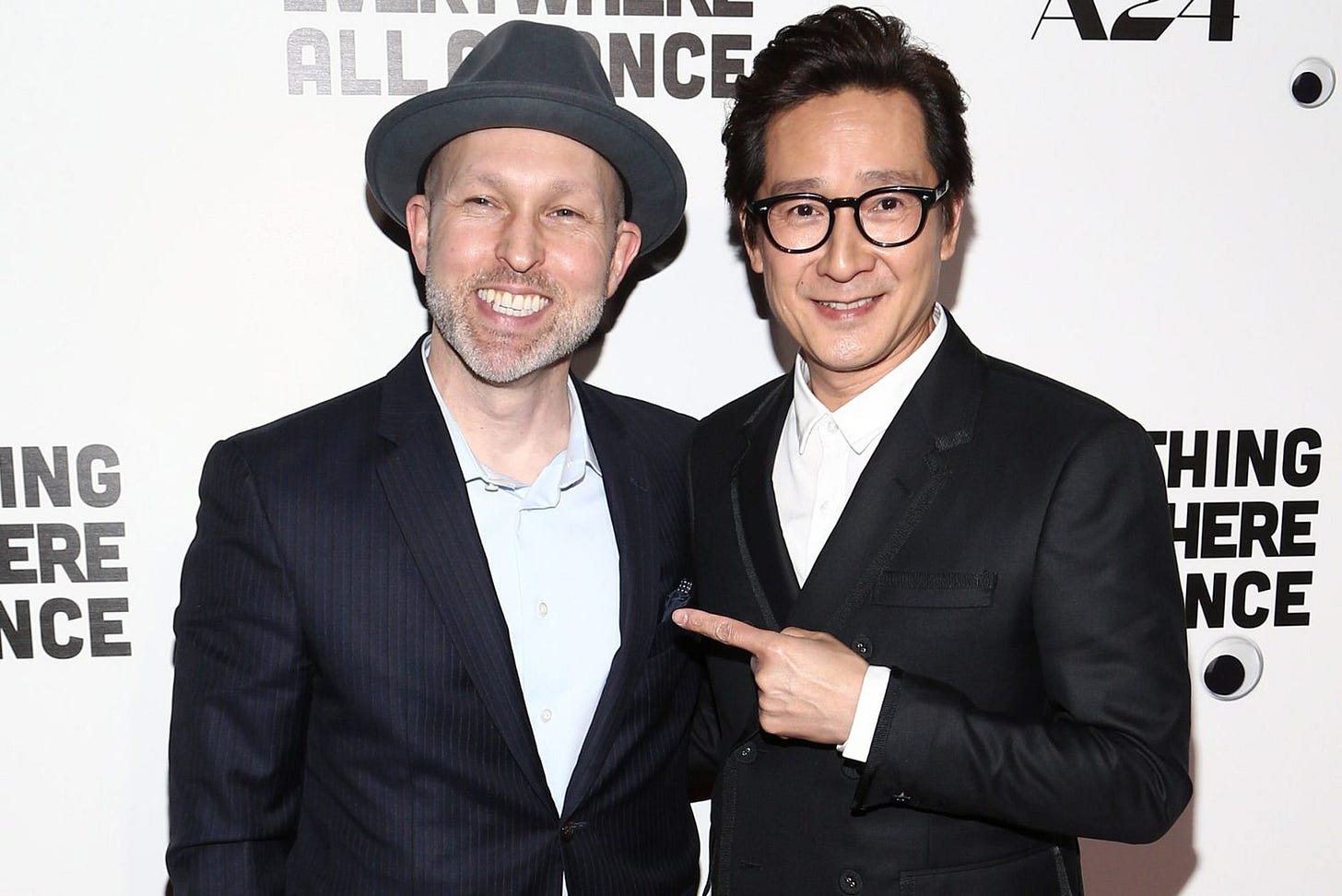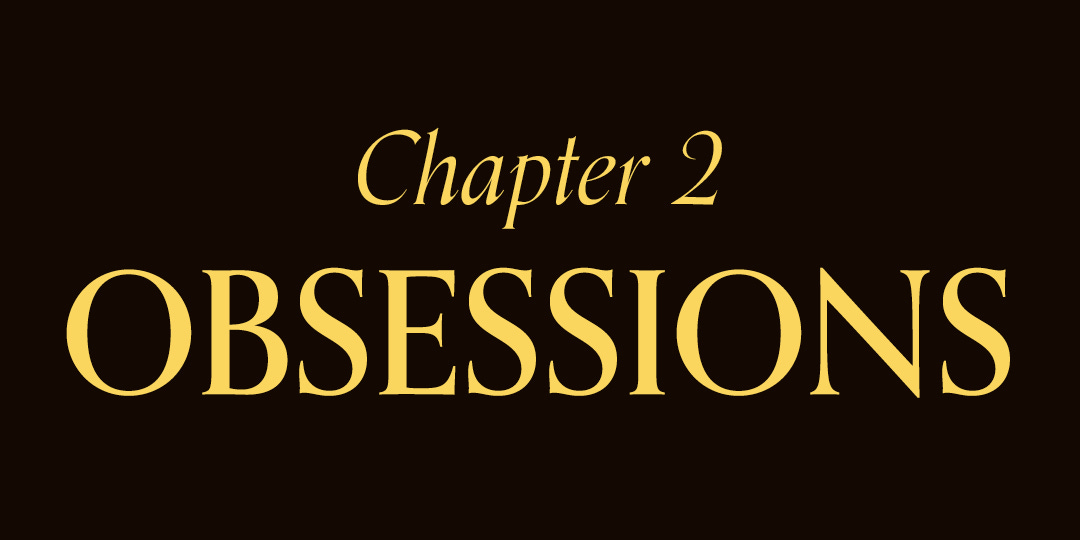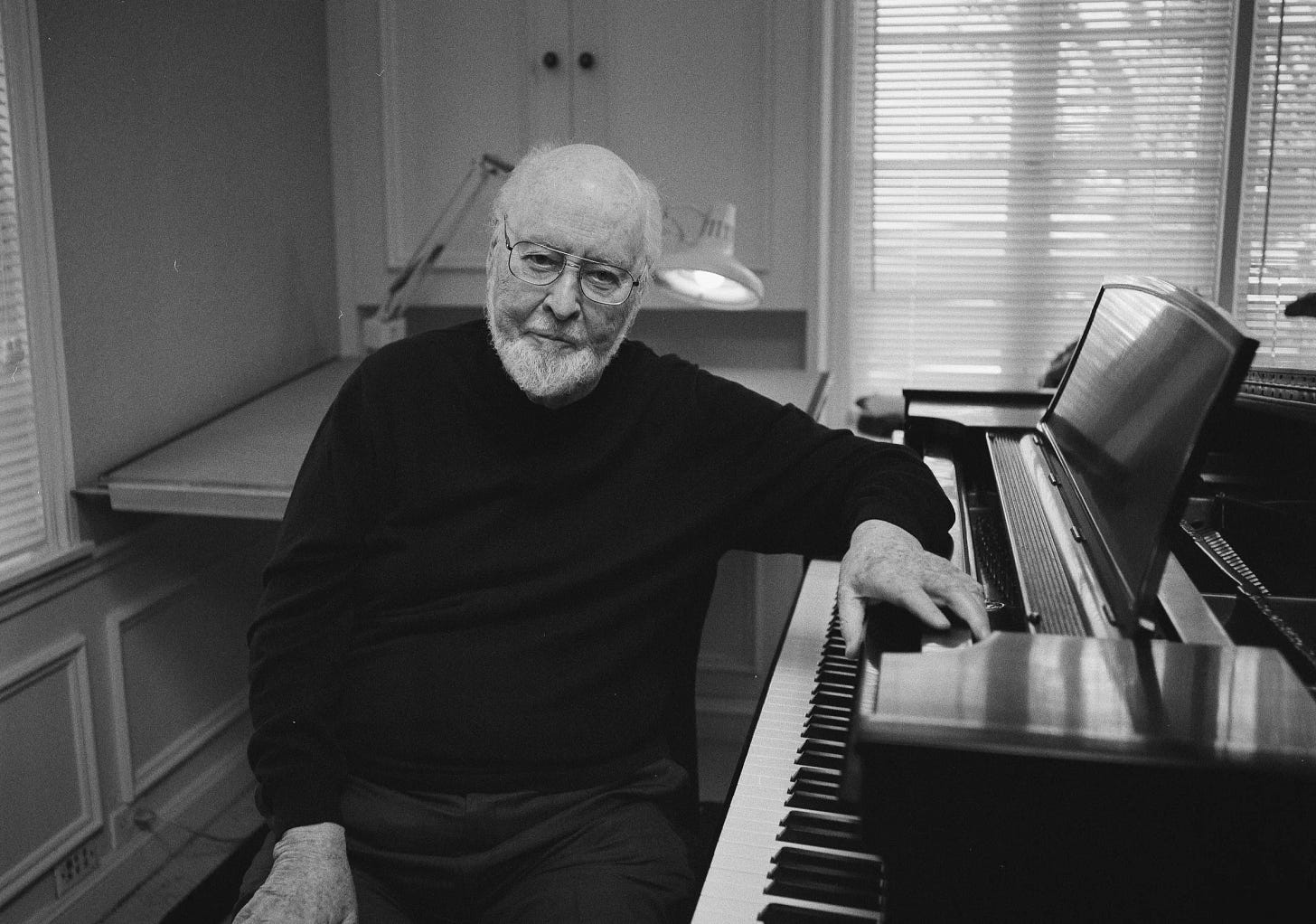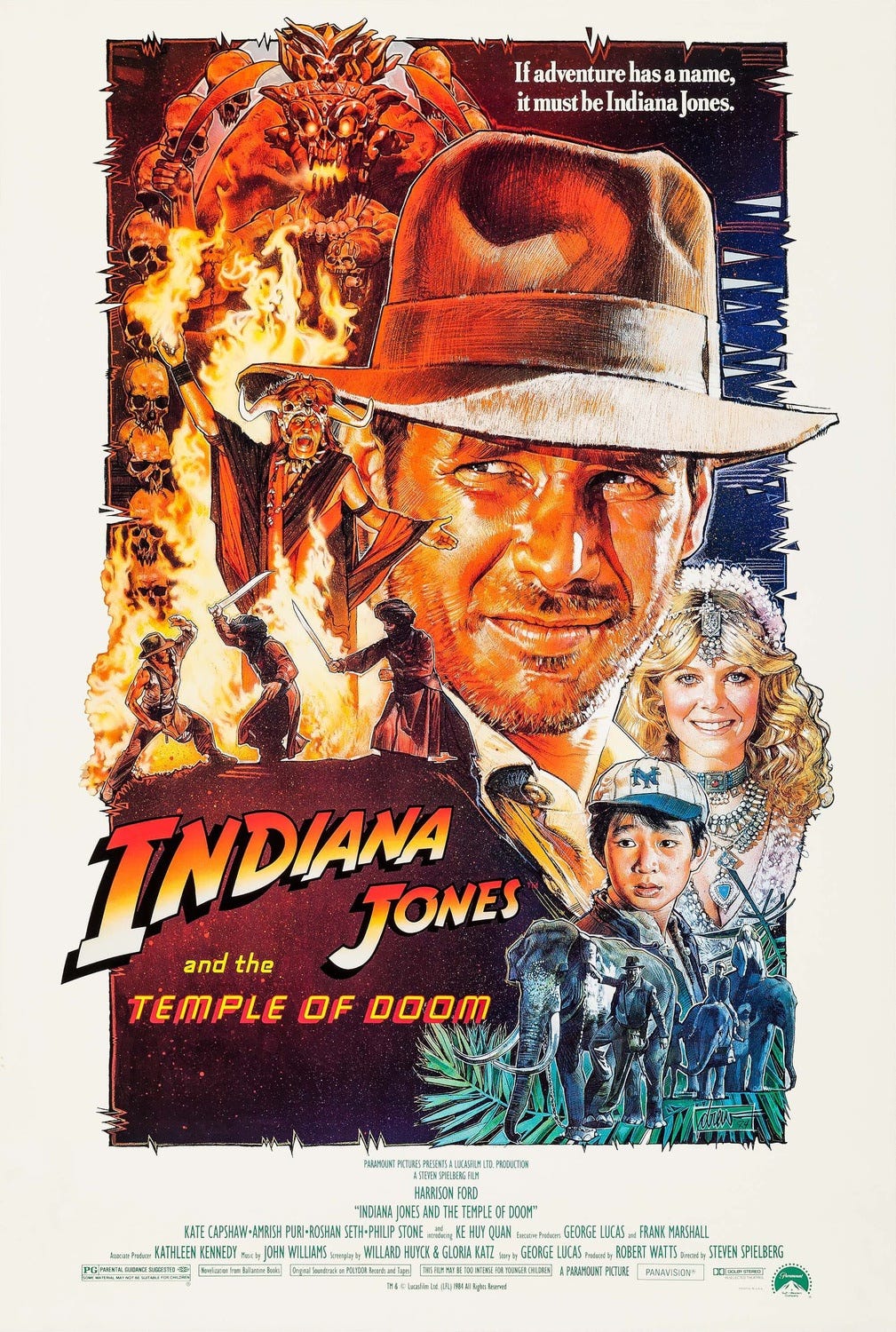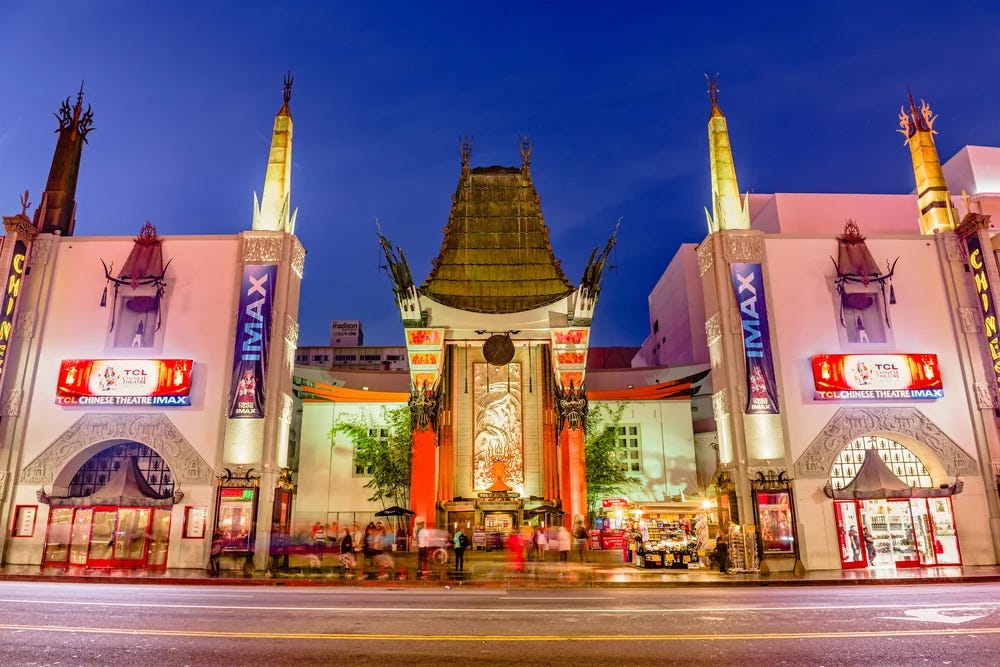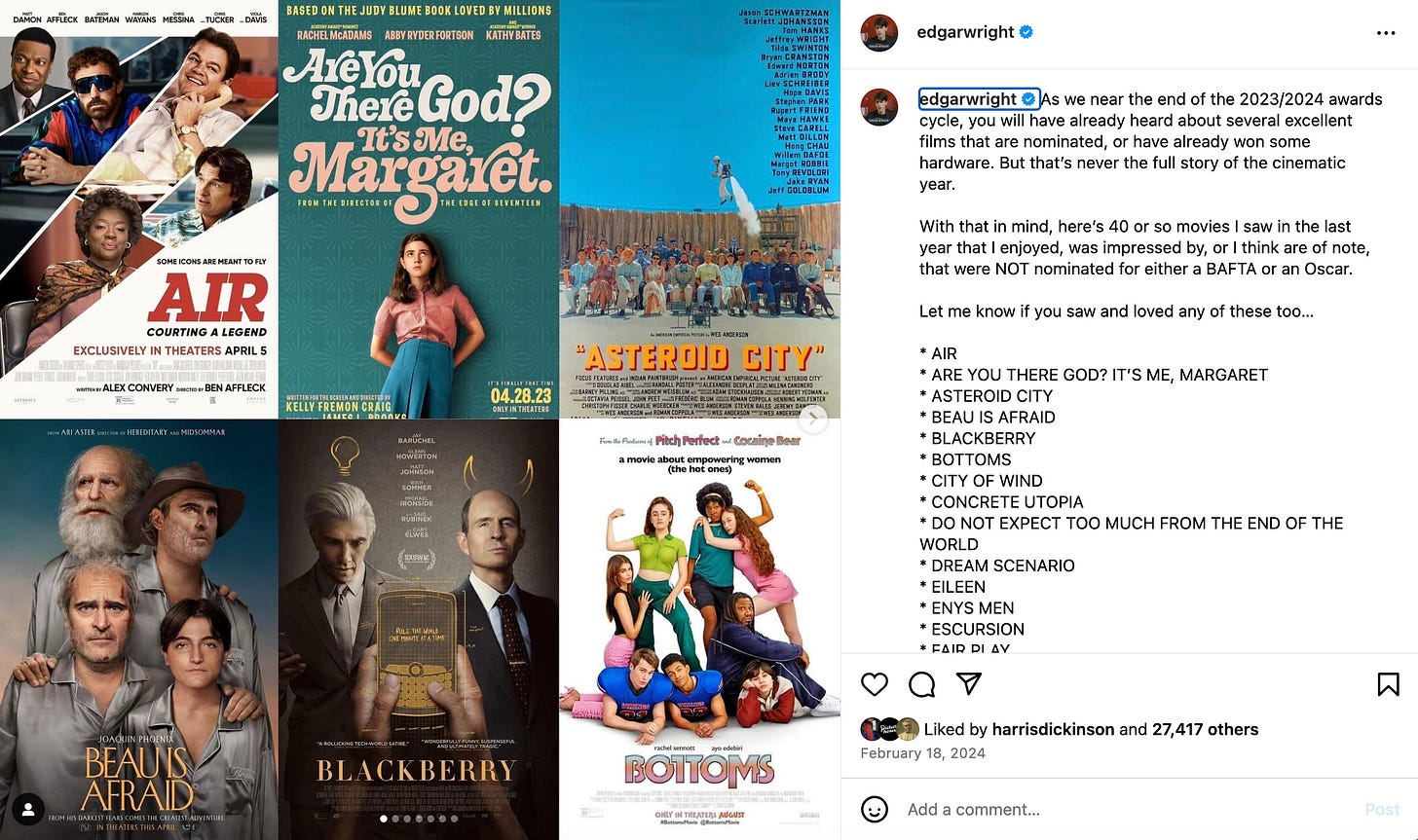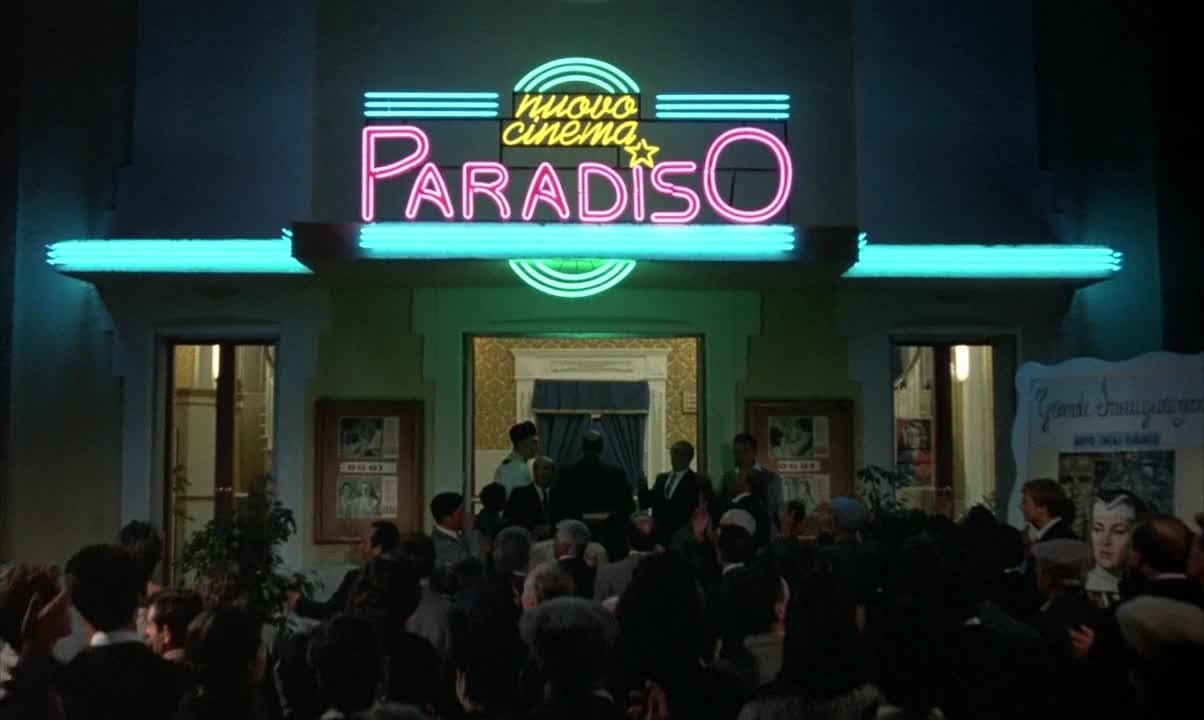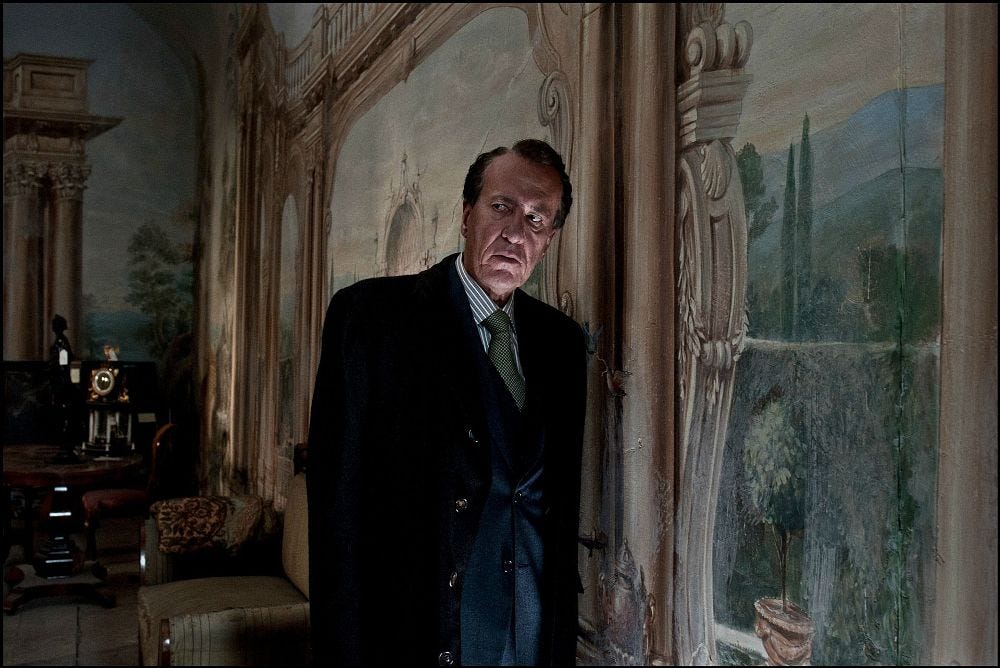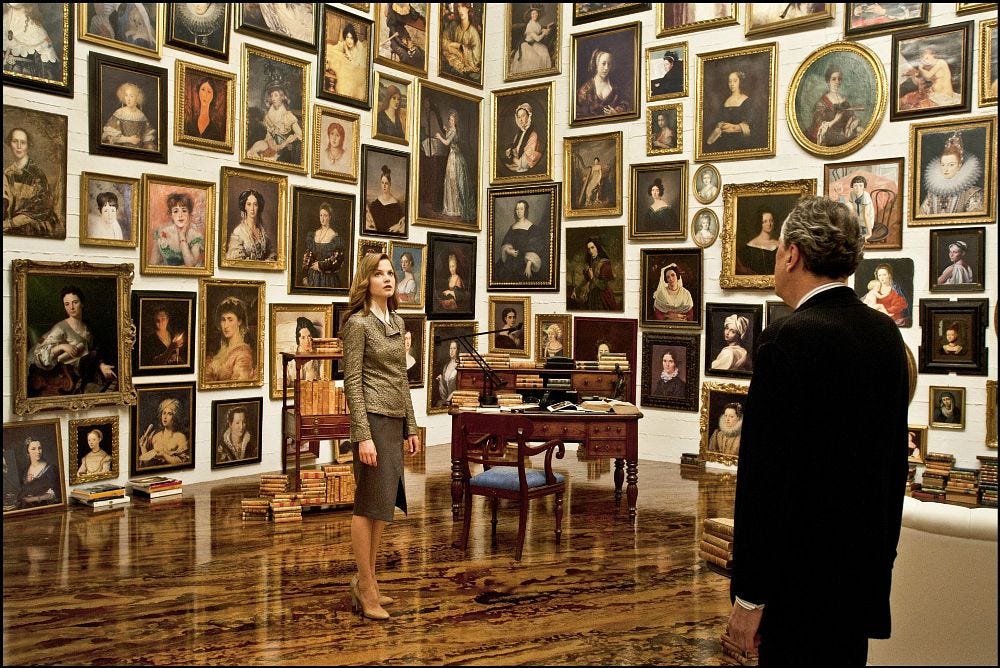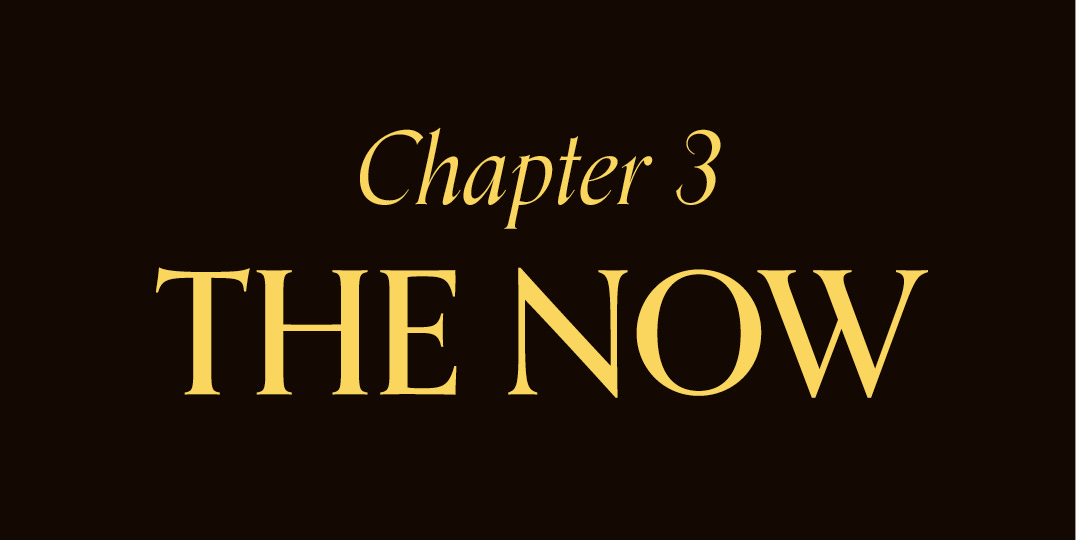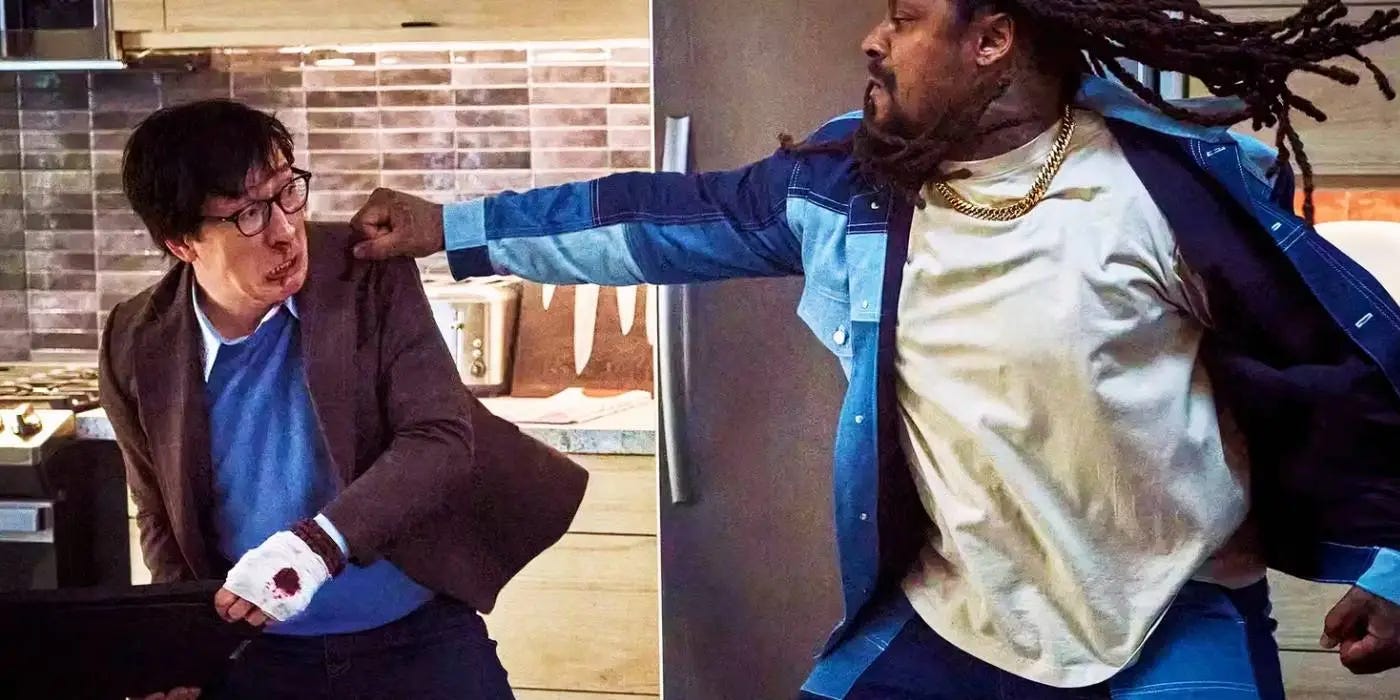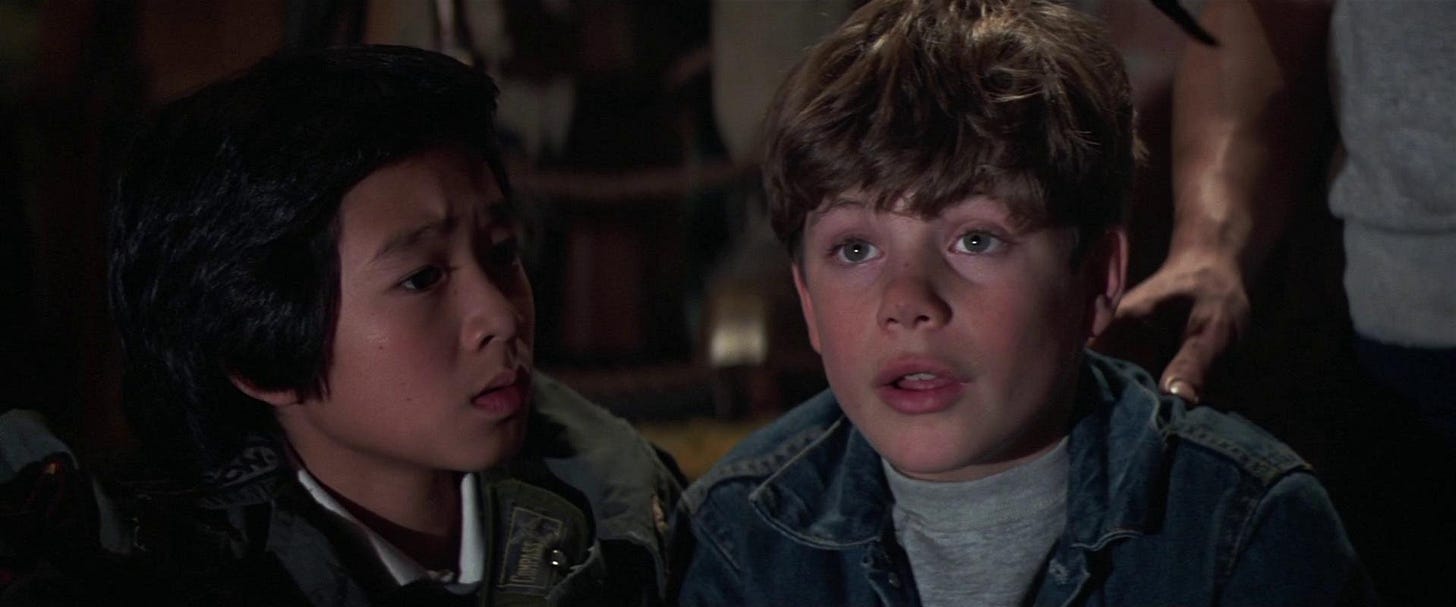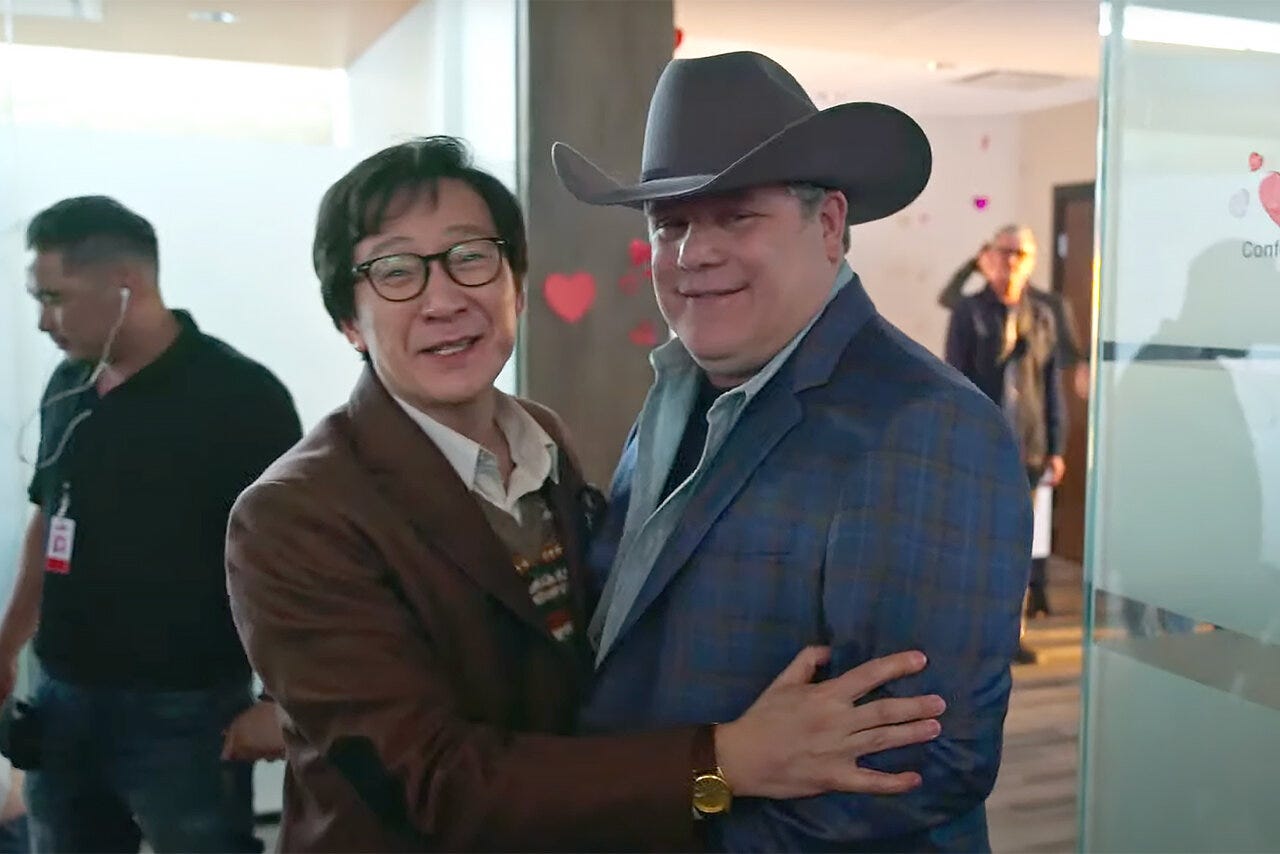Cinétherapy: Ke Huy Quan
“Kathy Kennedy said to me, ‘Ke, keep it simple, follow your heart,’ and so, to this day, everything that I do, I follow my heart.”
Ke Huy Quan stole the show as Short Round in Indiana Jones and the Temple of Doom (1984) and the gadget-loving Data in The Goonies (1985). He stepped away from acting for nearly two decades, turning his attention to action choreography and assistant directing. In a major comeback, he re-entered the spotlight with Finding Ohana (2021), followed by his career-defining role in Everything Everywhere All at Once (2022), which earned him an Academy Award for Best Supporting Actor, making him the first Vietnam-born actor to win an Oscar. His latest film, Love Hurts, is out now.
What’s your earliest film memory?
Because of my very unique background, I didn’t watch movies [as a young child]. You know, in Vietnam where I was born [in 1971], it was during the war, and there was so much going on. It was not until I immigrated to Los Angeles, and I discovered a local video store. We were living in Chinatown and there was a local video store that only rented out Hong Kong TV, soap operas, so that’s what my sister would rent, and we would watch them on the telly. About a mile away, there was a local cinema [Kim Sing Theatre] that only played Hong Kong movies, and my very first time there I watched Mad Mission with Samuel Hui. It’s kind of like James Bond. I never saw James Bond, so my first introduction to the James Bond world was Mad Mission. There were a lot of cool gadgets in the movie. There was action, there were explosions, there were car sequences, there was comedy, and I was just blown away, and I loved it.
Did your parents influence your taste in cinema growing up?
My parents didn’t watch movies. They had nine kids. They pretty much gave up everything as they had to get all the kids to Los Angeles, and when we got here, they were working jobs, trying to pay off the debt, and also trying to feed nine kids. So as you can imagine, the last thing they had time for was watching. The entire family is in business. I’m the only one that’s in the movie industry.
Your first job was Indiana Jones and the Temple of Doom, in 1984, when you worked with three industry titans, Steven Spielberg, George Lucas and Harrison Ford. Can you recall meeting them for the first time? And what did you learn from them?
I remember walking in the room, and there was Harrison, George and Steven. They were really friendly and very caring. They were constantly asking “Ke, are you having a good time? How are you feeling? Are you ready to try this?” They were full of ideas and every time I did something they would just scream out, “Ke, that's great. Now, try this, try that. Okay, we do that again.” So they were very specific with their directions. I remember feeling incredible in the room. Whatever I was doing, I was making them laugh. I was entertaining them, and I was getting high fives and hugs. It was a wonderful afternoon.
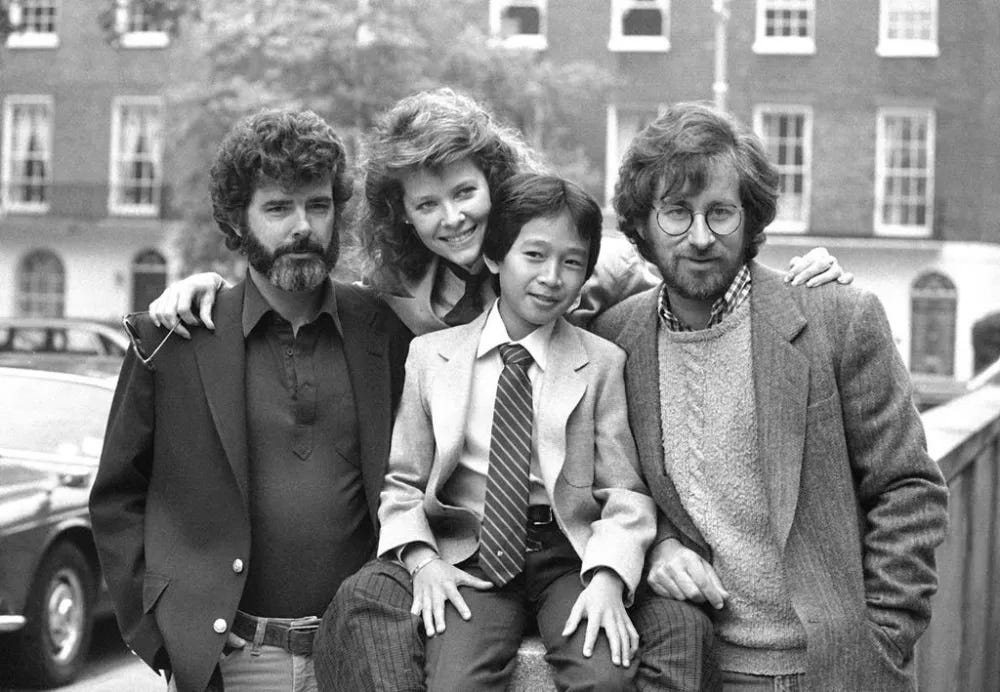
What’s your favourite scene from that movie?
There are two I remember the most. One was the big dinner scene, where they carve open a snake, and then you see these eels coming out of it. I didn’t know about movie props, so when they brought out the monkey’s head with the brain, and the soup with the eyeballs, and then the snake, it looked so real that I was actually scared. When they get the shot where the guy puts the eels down his throat, I freaked out, but I was also completely mesmerised by what we were doing, because I’d never experienced it.
How did Spielberg, Harrison Ford and your scene partner Kate Capshaw respond when you freaked out?
Whatever you see in my expression in the movie, that’s how I really felt. Steven would reassure me, “Ke, this is all fake,” and he actually ate the monkey brain, which was disgusting to me, but he said it tasted really good. It was kind of like a dessert. So that’s one scene that I remember.
The second scene that remember was the mine cart. When I was little, we didn’t get to go to theme parks. We didn’t get to go to Disneyland, so that mine car was a roller coaster to me. There would be camera strapped on the mine cart, or a dolly going alongside it. And I felt like I was at a theme park; I didn’t know what a theme park was. To this day, I don’t like real roller coasters, because that’s the one that I was on. Those two scenes stick out the most, because in one I had the most fun, and the other one scared the shit out of me.
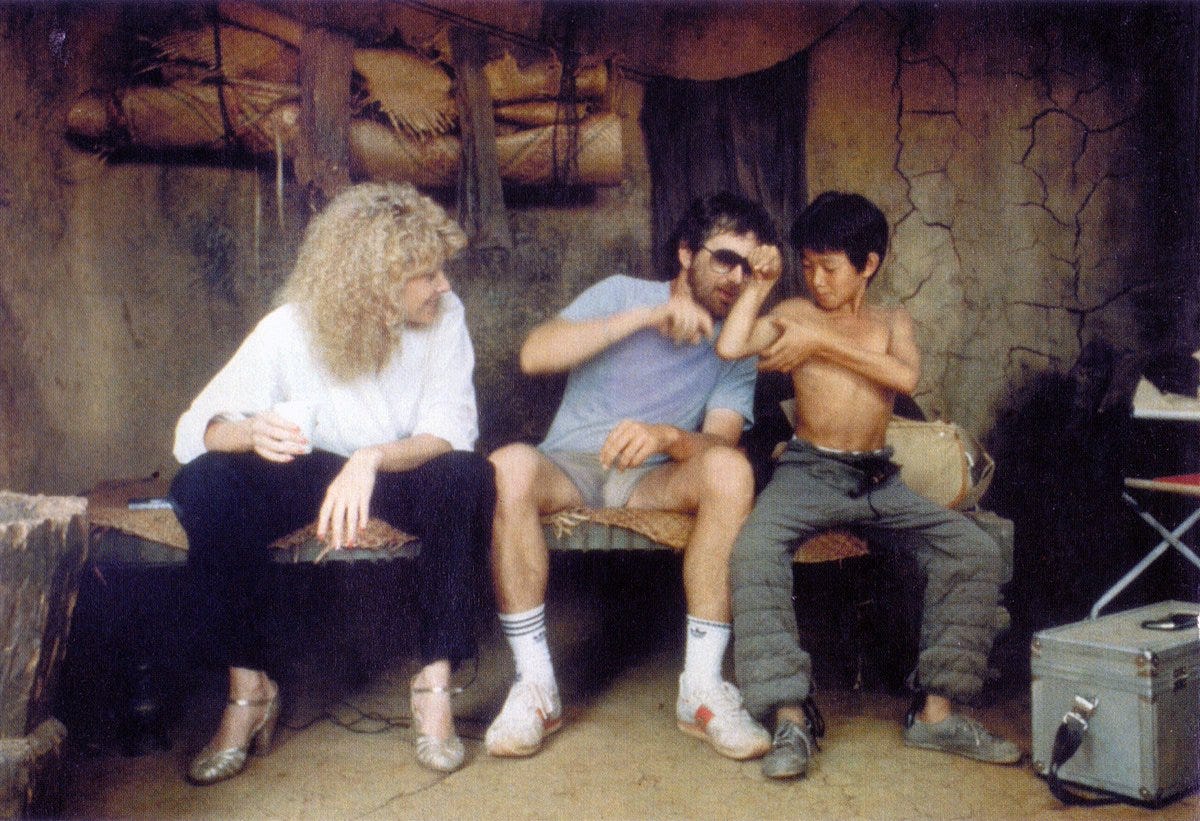
The comedy dynamic and the chemistry between Indy, Willie and Shorty, for me, was perfection, and it was so watchable. What was the funniest or most memorable moment the three of you had together on this movie?
We were constantly playing tricks on Steven. They would have these water guns on set, and they would give them to me. When Steven was setting up a shot, I would go behind him, and I would just squirt him with the water gun. That was the kind of environment on set. We were constantly playing, telling jokes, playing tricks on each other, and when we went to London to shoot in the studio [Elstree Studios], I think it was summertime, we were shooting the mine cart, and they would bring in ice creams for all of us to have. There was always laughter. I remember there was always laughter. A lot of high fives, a lot of hugs. It was just such a warm, wonderful, friendly environment for a kid like me. I just had the best time.
You went from being the only kid on set most of the time on Indiana Jones to filming The Goonies with a bunch of kids. How was that experience?
I’ve got to be honest, I didn’t like it in the beginning because on Temple of Doom, I got all the love, you know, I got all the praise. I was the only kid, so I got all the attention. Suddenly, I arrived on the set of The Goonies, with those six other kids, and they’re just as vibrant and energetic and loud as I am. And now all of a sudden, I feel like, oh, wow, I need to compete for [director] Dick Donner’s attention with the six other Goonies.
I remember the first day, when we shot the scene where Data crashes through the screen door and the little statue of David falls. That was the first scene that we did. I was waiting for my turn to speak my line, and it never came. It never came because everybody was just ad libbing. Sean [Astin], Corey [Feldman] and Jeff [Cohen], they were just talking over each other. That was something I was not used to, because on Indiana Jones each of us would take turns saying lines. On the set of The Goonies, it was so different. I was like, wait a minute, what’s going on? It’s my turn to speak, and they’re speaking over me. But of course, I quickly adapted, and I think that’s what makes the movie so great. It's just us being kids and just fighting to speak over one another.
Which is what we all do when we’re kids.
That’s what we all did in our house.
What’s the most treasured piece of industry advice you’ve been given, and how do you live by it?
After [college] graduation, I went to visit Kathleen Kennedy while she was making Jurassic Park. She has produced one incredibly successful movie after another, and I remember asking her, “how do you do it? How do you pick your projects? How do you pick your scripts?” And she said, “Ke it is very simple, I just follow my heart. I just follow my heart.” And so, to this day, everything that I do, I follow my heart. If my heart tells me that this is something that I should do, I just go for it.
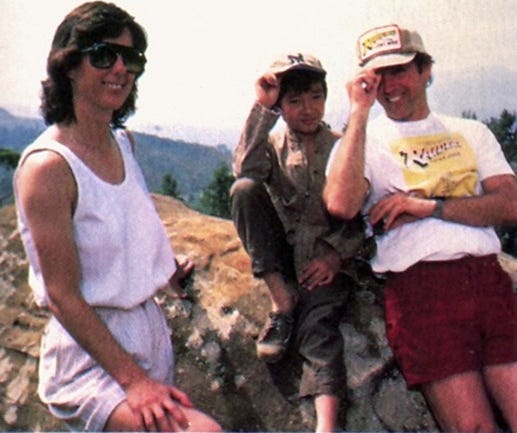
That’s beautiful. What part of the creative process gives you the most pleasure?
When I was a kid, I was just being myself. But I think now, as an adult actor, in the beginning, the most challenging thing is trying to find a character and how I want to play him. I always have a few days on set trying to find my character. When I know who he is, when I can think like him, I can walk like him, I can move like him and talk like him, then I get satisfaction. Then I know that, Oh, I understand this character now. And I can be authentic – he can be real. And that’s when he really gets me super excited to go on set the following day.
Which films and actors that shaped your style of work or shaped your aesthetic?
I feel like I’ve spoken a lot about Spielberg and Lucas and Harrison and just observing how they treat people and how they approach their work with so much passion and enthusiasm. That’s why, every time I walk on set, I have this incredible sense of gratitude, and know how lucky I am, which really stems from that experience.
What’s the most memorable souvenir that you bought home from set?
I would have to say the Data jacket. I still have that. There were only two that I wore in the movie, and I have one of them. It’s kind of cool, because, you know that jacket is so iconic. One of my most prized piece of memorabilia from my movies.
Where do you keep it?
It’s just in a box in my office, with other boxes stacked on top. I don’t even know which box, but it’s somewhere in there. I haven’t seen it in a while.
You should get it framed, like people do with football shirts, and put it on your office wall.
Totally. I want to totally do that, but every time I want to do that, I get pulled away to do something else.
Who is your oldest friend from the industry?
Jeff Cohen. I love him because we kind of went through similar struggles when we were kids. He was adorable, he was Chunk [in The Goonies], but then he hit puberty, lost all the weight, and he couldn’t get a job as an actor anymore. I kind of went through the same thing. When The Goonies came out, it was him and I who went around the world to promote the movie, meaning his family and my family got to hang out together. We didn’t really hang out again until we both graduated from college, when we reconnected and became best friends. He started his law firm and I was one of his first clients. I didn’t make him any money for a long, long time. But every time I called him, he would always be there for me. He would always give legal advice and when I was going through a tough time, he would always tell me everything is going to work out. And now, you know, I’m beginning to make him some money so I’m very happy. Every time I write him a cheque, I’m super happy. I say, “Jeff, you deserve this. You’ve been working for free for so many years.”
Do the two of you still hang out as friends?
His family lives very close to me. We have dinner. In fact, we just saw each other yesterday. We had dinner yesterday. We get to see each other quite often.
What’s that one thing in a film that lights a fire in you?
Can I say movie scores?
100 per cent.
John Williams’s movie scores really, really get me excited. I grew up in the 80s, so I grew up on Spielberg movies. And every time I hear either the themes from Star Wars, Indiana Jones or Superman, I get super excited because it takes me back to when I watched them in theatres, and there’s something very special about his music, because it's immediately recognisable. You know what movie it is, and you know what scene it is. I love listening to John Williams scores. In fact, I love movie scores in general. When I try to get in a creative mind, I play movie music, and it allows me to go places where I wouldn’t be able to go without it. And it’s especially John Williams’s scores that get to me. When I was a kid and I did a press conference, I walked out, and they played that music.
Those scores do the same for me.
You know, if you there’s one scene in one movie that I watch all the time, it is a scene in Superman, Dick Donner’s movie. I’ve seen it over a hundred times. It’s when Lois Lane is hanging on to the helicopter, and Clark Kent runs and tries to find a place where he can change into Superman. He sees a phone booth he can’t do anything with, so he runs across the street where there’s a revolving door. He goes in, comes out as Superman, and then he takes off. That John Williams score is incredible. Every time I watch that scene with that score, it just gives me this feeling that I can do anything, anything is possible.
That’s how movies should make us feel. Do you collect anything film-related?
I collect Blu-rays. I have those and DVDs and just a lot of stuff that over the years, fans would give me. I don’t want to throw anything away, because it’s part of my history. I keep it all in boxes and once in a while, I go through them and take a nice trip down memory lane. I’m looking around my office right now, I have an Indiana Jones poster. I have a Goonies poster.
Which ones?
It’s the original [Temple of Doom] that Spielberg gave me, I’ve had this poster for 40 years now. When the movie came out, Steven sent this to me. I’ve moved to different houses over the years, and every new house that I live in, the first thing that goes up is this poster.
What’s your favourite cinema?
It’s the TCL Chinese Theatre, which used to be called Mann’s Chinese Theatre. That’s where we premiered Indiana Jones, 40 years ago. And what’s incredible is that in front of the theatre, they have the handprints and footprints of incredible actors and filmmakers. A week ago, I was honoured with my own handprint and footprint ceremony. Wow, it was such a full circle moment for me, my fellow Goonies were there to share the incredible moment with me. Just putting my hand on the cement was incredible. Over the years I would go there, and I will always get there early, then walk around and if I see someone I like, I would get down on the ground and put my hand over their handprint to see how big the hands are, and what it feels like. To finally be able to do this was a huge honour for me
What era of cinema do you love the most, and why?
It will be the 80s, for two reasons. One is, I love Hong Kong cinema and in the 80s, Hong Kong cinema was having a golden age. There were so many great movies that came out of that era: the gangster movies, the action movies, especially from Jackie Chan, Sammo Hung and Yeun Biao.
Then there were a lot of comedies at the same time, a lot of movies that I grew up with here in America. The Back to the Futures, of course, Indiana Jones. And you know, they’ve tried to remake them, but there’s just something very special about that era that can’t be replicated. There was an innocence to those movies, there was a pureness to those movies. It was also a time where filmmakers were allowed to pretty much do anything they wanted, and they just went wild. Now it’s very different. It’s very algorithm-led. It’s about what movies are marketable, what makes money. You have streaming now, but back then, there were not a lot of movies in the theatres. There were only a few that played for six months, nine months, and you would go and you would watch it again and again and again, and spend time getting to know the movie, and then you will have a new one, and then you would do the same. I love the purity of it. I don’t like a big selection. I like to get to know and understand the movie and what the filmmaker was trying to make.
Are you obsessed with any film character’s sartorial style?
I love costumes that that you can recognise right away. Before the last Indy movie came out, there was that shot of just a shadow of a fedora hat and immediately you recognise that.
Which filmmakers do you enjoy following on Instagram?
I love Edgar Wright. I had the pleasure of meeting him in London. He’s such a big movie buff, he wakes up, and the first thing he does is watch a movie. I love his passion for movies. A lot of time through his IG, I realise, “oh, there was this movie that came out that I didn’t even know about”. Because he has such great taste in movies, when he says, “Guys, go watch this movie,” that’s when I go, “Okay, I’m gonna go watch this movie, just because Edgar Wright says so.”
Which film have you watched the most?
I would say Cinema Paradiso. And I’ve heard that soundtrack more than any other soundtrack. What I love about that movie is that you have this innocent little kid who found his true passion in life in a movie theatre. And for me, I found my true passion on the set of my first movie. So watching that movie kind of takes me back to that first time seeing everything for the first time. Every time I watch that movie it brings me right back to my 12-year-old self.
What’s the last film someone told you to watch – and was it any good?
I forgot who recommended it, but it was Anora. I loved it, of course, and it’s now an Oscar-nominated movie.
And what’s the one film that you recommend to people that nobody seems to know?
I always recommend this, and nobody’s ever heard of it, and I think it’s an incredible movie: The Best Offer. Have you seen it?
No. Tell me about The Best Offer.
It’s directed by the same director who did Cinema Paradiso [Giuseppe Tornatore]. It is beautifully shot, beautifully directed, beautifully acted, but also it’s about – without giving too much away, because I do want you to watch it – an old man, an art lover who works in an auction house. Every day he goes to the auction house, looks at art, and one day, he meets a woman and absolutely falls in love with her. Nobody’s ever heard of it, but I saw it on TV and I was just blown away by how great it was. Any time that people ask me to recommend something, I say go watch this movie.
I’m adding it to my list immediately.
Watch it. You won't be disappointed.
What film best reflects your sense of humour.
I don’t know if I have one! I like stupid humour. I like all kinds of humour. I watch Monty Python and laugh hysterically, or I can watch Austin Powers and be on the floor laughing, too. It really depends on the mood.
What was it like, 41 years into your career, on day one of shooting Love Hurts, your first day as a lead in a big studio movie?
It felt surreal. It was exciting, but also tremendous pressure. I felt how incredible the opportunity was and, at the same time, made sure that the cast and crew felt welcomed and part of the family, because no movie is done alone. It’s a collaborative process. I’ve seen it and learned from the best. So when I was number one [on the call sheet], I wanted everybody to feel the way I felt when I was working with all those wonderful filmmakers.
It’s such a feel-good movie. I came out of the cinema with a spring in my step.
Thank you for that, I really appreciate it. When you asked me earlier about my favourite movies 80s movies, that’s how I felt, after watching them, just having a good time coming out, feeling a little refreshed.
Many of your previous films have a fantasy element, so was it a refreshing challenge to do something more grounded, in Love Hurts, playing an ordinary guy?
Yeah, I love grounded stuff. It’s a tremendous challenge to do the fight scenes for real, where we didn’t have visual effects. It was like going back to the basics. There’s something really cool about being very raw and grounded and real with those fights. It was fun to do and for me, those are the best fight scenes because you can see the actors doing it. There were no camera tricks. Everything you see is real.
How do you feel, as an actor and an action choreographer, about the influence of CGI on stunt work?
I think it’s good. It saves a lot of lives. It prevents a lot of injuries. When you’re doing these kind of stunts and action sequences, I think we’re in an age where you don’t have to have a guy fall off a 10-storey building: CGI can make it look just as good, because that is a very dangerous stunt. So to have CGI be a part of that is beneficial – but at the same time, we can’t overuse it. CGI is only there to enhance a fight and also to protect the stuntmen. Those days of Jackie Chan falling off a three-storey building with no mats, those stunt guys getting hurt, they had ambulances waiting on the set to take them to the hospital – yeah, it looks great, but movies have advanced to the point where we can use CGI to be safe. But we can’t go, “oh, this is so much easier. Let’s just fix it in post.”
You’ve always played the good guy. Have you got any interest in playing a baddie?
Absolutely. I’m playing a bad guy next. I’m doing a movie [Bad Boy] for Dave Caplan, who produced Longlegs, and I play a serial killer, which is super exciting to me.
Is it a horror film?
Yes.
Have you filmed it yet?
Not yet, we’re going to do it in the summer. It’s really fascinating. A teaser for you: the whole movie is from the point of view of a dog. I’ve never seen a horror movie done like this. I’m super excited. Through the dogs eyes, we understand whether his owner is a bad guy or not. The director [Jacob Chase, Come Play] is amazing. Dave Caplan produced Longlegs and The Monkey. Very smart man,
On Everything, Everywhere, All At Once, did the Daniels [directors Daniel Kwan and Daniel Scheinert] ask you to help recreate the look and feel of a Wong Kar-wai movie since you’d worked with him on 2046?
They didn’t need to. They are both as big a fan as I am. They knew all about his movies. In fact, the DP [Larkin Seiple] and the Daniels are big fans. When we were shooting that scene, I walked on set and it was like I’d just stepped into a Wong Kar-wai world. A lot of fun.
You trained as a martial artist. What are your favourite movies in that genre?
Can I be greedy and name a couple of them?
Of course.
Project A, Drunken Master, The Matrix, I love these, all incredible action movies. John Woo, A Better Tomorrow. I’m a big martial arts action fan.
In Love Hurts, you reunite with your co-star from The Goonies, Sean Astin. Is there any truth to the rumour about a sequel to The Goonies?
Fingers crossed. I want it to. I think, it’ll be nice to go on another adventure with my fellow Goonies, but I want us to be on the adventure. I don’t want it to be about the kids, I want it to be the original Goonies. We’ve been talking about it for 40 years. It would just be really wonderful to be with them again.
Shows like Stranger Things hark back to The Goonies. There’s definitely an audience and appetite here for it.
Yeah, I would totally do it. I think all of us would. I still see my fellow Goonies. There’s that bond there. We’re family. We don’t see each other often, but when we do, it’s like we never left each other, that love is still there. It was really nice to be recently reunited with Chris Columbus, whom I hadn’t seen in person for a long time, who wrote that incredible script. So now I guess it’s really up to him – and our head Goonie Spielberg.
Love Hurts is out in cinemas worldwide.
What’s next for Ke Huy Quan?
The Electric State (dir. Anthony Russo & Joe Russo, March 14, 2025)
Fairytale in New York (dir. Jalmari Helander, Christmas 2025)
Bad Boy (dir. Jacob Chase, 2026)


